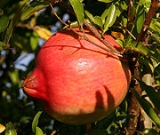
Punica
Encyclopedia
Punica is a small genus of fruit
-bearing deciduous
shrub
or small tree
s. Its best known species is the pomegranate
(Punica granatum). The only other species in the genus, the Socotra pomegranate
(Punica protopunica), is endemic
on the island of Socotra
. It differs in having pink (not red) flowers and smaller, less sweet fruit.
Although previously placed in its own family of Punicaceae, recent phylogenetic studies have shown that Punica belongs in the family Lythraceae
, and it is classified in that family by the Angiosperm Phylogeny Group
.
Fruit
In broad terms, a fruit is a structure of a plant that contains its seeds.The term has different meanings dependent on context. In non-technical usage, such as food preparation, fruit normally means the fleshy seed-associated structures of certain plants that are sweet and edible in the raw state,...
-bearing deciduous
Deciduous
Deciduous means "falling off at maturity" or "tending to fall off", and is typically used in reference to trees or shrubs that lose their leaves seasonally, and to the shedding of other plant structures such as petals after flowering or fruit when ripe...
shrub
Shrub
A shrub or bush is distinguished from a tree by its multiple stems and shorter height, usually under 5–6 m tall. A large number of plants may become either shrubs or trees, depending on the growing conditions they experience...
or small tree
Tree
A tree is a perennial woody plant. It is most often defined as a woody plant that has many secondary branches supported clear of the ground on a single main stem or trunk with clear apical dominance. A minimum height specification at maturity is cited by some authors, varying from 3 m to...
s. Its best known species is the pomegranate
Pomegranate
The pomegranate , Punica granatum, is a fruit-bearing deciduous shrub or small tree growing between five and eight meters tall.Native to the area of modern day Iran, the pomegranate has been cultivated in the Caucasus since ancient times. From there it spread to Asian areas such as the Caucasus as...
(Punica granatum). The only other species in the genus, the Socotra pomegranate
Punica protopunica
Punica protopunica, commonly known as the Pomegranate Tree or Socotran Pomegranate, is a species of flowering plant in the Lythraceae family. It is endemic to the island of Socotra...
(Punica protopunica), is endemic
Endemic (ecology)
Endemism is the ecological state of being unique to a defined geographic location, such as an island, nation or other defined zone, or habitat type; organisms that are indigenous to a place are not endemic to it if they are also found elsewhere. For example, all species of lemur are endemic to the...
on the island of Socotra
Socotra
Socotra , also spelt Soqotra, is a small archipelago of four islands in the Indian Ocean. The largest island, also called Socotra, is about 95% of the landmass of the archipelago. It lies some east of the Horn of Africa and south of the Arabian Peninsula. The island is very isolated and through...
. It differs in having pink (not red) flowers and smaller, less sweet fruit.
Although previously placed in its own family of Punicaceae, recent phylogenetic studies have shown that Punica belongs in the family Lythraceae
Lythraceae
Lythraceae are a family of flowering plants. It includes about 620 species of mostly herbs, with some shrubs and trees, in 31 genera. Major genera include Cuphea , Lagerstroemia , Nesaea , Rotala , and Lythrum...
, and it is classified in that family by the Angiosperm Phylogeny Group
Angiosperm Phylogeny Group
The Angiosperm Phylogeny Group, or APG, refers to an informal international group of systematic botanists who came together to try to establish a consensus on the taxonomy of flowering plants that would reflect new knowledge about plant relationships discovered through phylogenetic studies., three...
.
Species
- Punica granatumPomegranateThe pomegranate , Punica granatum, is a fruit-bearing deciduous shrub or small tree growing between five and eight meters tall.Native to the area of modern day Iran, the pomegranate has been cultivated in the Caucasus since ancient times. From there it spread to Asian areas such as the Caucasus as...
L.Carolus LinnaeusCarl Linnaeus , also known after his ennoblement as , was a Swedish botanist, physician, and zoologist, who laid the foundations for the modern scheme of binomial nomenclature. He is known as the father of modern taxonomy, and is also considered one of the fathers of modern ecology... - Punica protopunicaPunica protopunicaPunica protopunica, commonly known as the Pomegranate Tree or Socotran Pomegranate, is a species of flowering plant in the Lythraceae family. It is endemic to the island of Socotra...
Balf.John Hutton BalfourJohn Hutton Balfour was a Scottish botanist. Balfour became a Professor of Botany, first at the University of Glasgow in 1841, moving to Edinburgh University and also becoming Regius Keeper of the Royal Botanic Garden Edinburgh and Her Majesty's Botanist in Scotland in 1845...

